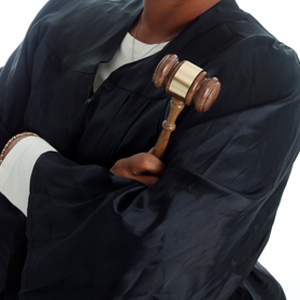State seeks to block judicial candidate after she is accused of donning robes, ruling on cases

Lawyer ethics regulators in Illinois are seeking the immediate suspension of a judicial candidate accused of donning a judge’s robes and ruling on motions in traffic cases.
The Illinois Attorney Registration and Disciplinary Commission filed the request with the state supreme court after the candidate, Rhonda Crawford, refused to take her name off the ballot, report the Chicago Tribune and the Cook County Record. Crawford is running unopposed for a judgeship covering parts of Chicago and some suburbs.
The suspension request asks the Illinois Supreme Court to block Crawford from becoming a judge if she wins the election.
Crawford said last month that she wore the robes and sat in a judge’s chair as part of a shadowing process, and she was always under the direction of the judge, according to a previous Chicago Tribune story.
A statement by Crawford’s campaign on Friday said she would not withdraw. “When people make honest mistakes they should not be crucified,” the statement said. “Ms. Crawford has already admitted that she donned a judge’s robe, but she was never trying to be dishonest.”
The disciplinary commission filed ethics charges against Crawford on Oct. 7. The Legal Profession Blog reproduces the allegations here.
The incident occurred Aug. 11 in the courtroom of Judge Valarie Turner, according to the ethics complaint. Crawford was a law clerk/staff attorney at the courthouse in the Chicago suburb of Markham.
Near the end of the afternoon court call, Turner announced that “we’re going to switch judges” and gave her judicial robe to Crawford, the ethics complaint alleges. Crawford didn’t correct the misstatement, put on the robes and took the bench, the complaint says. Turner stood behind Crawford.
The complaint alleges that Crawford proceeded to continue one traffic case; and denied a motion for a continuance in another after asking Turner if she could do so. That led the prosecutor to seek a dismissal, which Crawford granted, the complaint says. Crawford also granted the prosecutor’s next judicial motion.
The complaint also alleges that Turner had told the prosecutor earlier in the day that Crawford was a judge, and Crawford did not correct the misstatement. When an officer in the courtroom congratulated Crawford on her judgeship, Crawford did not correct the impression, according to the complaint.
Turner later told the presiding judge investigating the incident that she thought Crawford was a judge, according to the Tribune account.
Crawford was fired after the incident.



